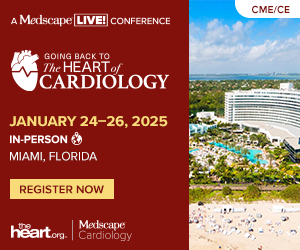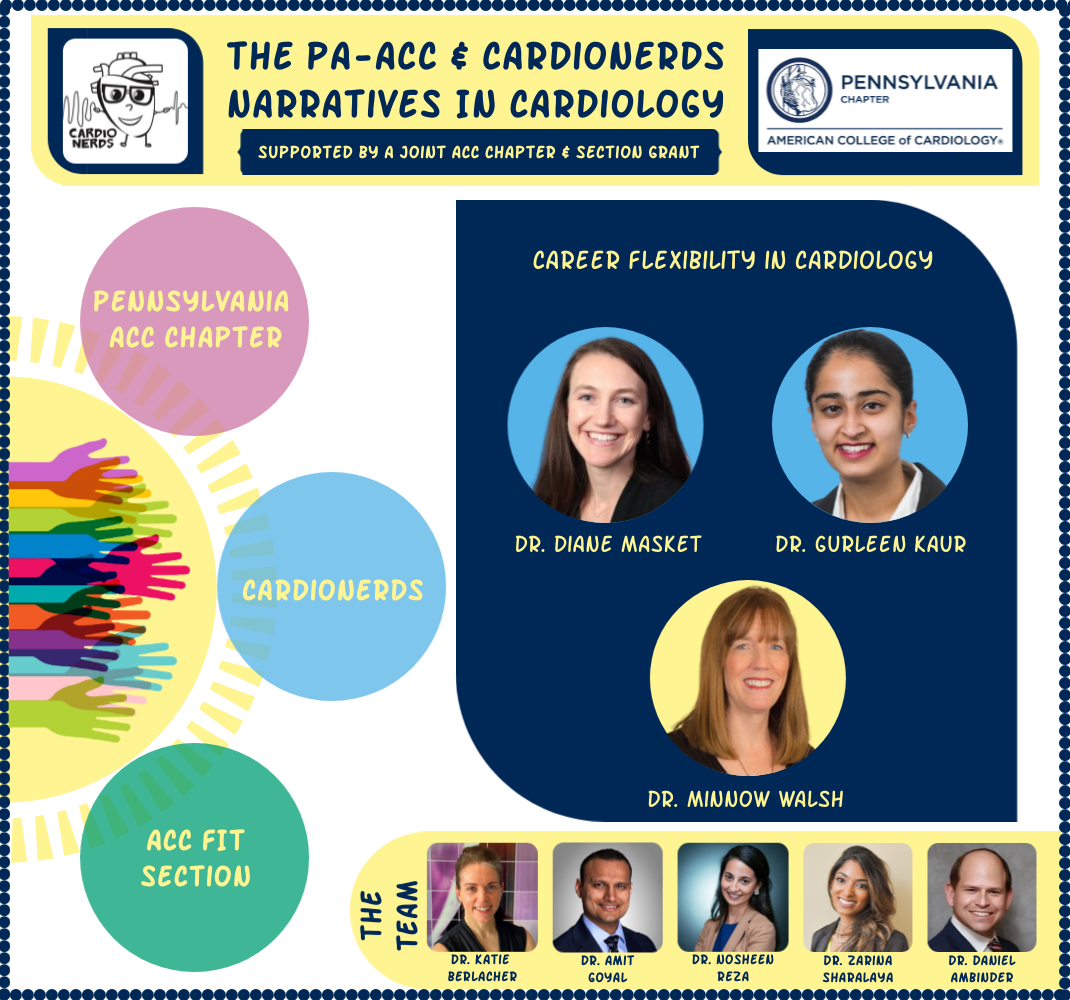Cardionerds: A Cardiology Podcast

398. Narratives in Cardiology: Career Flexibility in Cardiology with Dr. Minnow Walsh
In this episode, Dr. Gurleen Kaur (Cardiology FIT at Brigham and Women’s Hospital and APD of the CardioNerds Academy) and Dr. Diane Masket (Medicine Resident at the University of Chicago Northshore and CardioNerds Academy Intern) discuss with Dr. Minnow Walsh (Medical Director of the Heart Failure and Cardiovascular programs at Ascension St. Vincent Heart Center in Indianapolis) about her personal and professional journey in Cardiology. They discuss Dr. Walsh’s authorship of the recent ACC statement on career flexibility in Cardiology, her involvement with the ACC at both the local and national levels, and her passion for making cardiology a more inclusive and welcoming field for all.
Notes were drafted by Dr. Diane Masket and episode audio was engineered by student Dr. Grace Qiu.
This episode is supported by the 5th Annual Going Back to the Heart of Cardiology (A MedscapeLIVE Conference). Join co-chairs Dr. Robert Harrington and Dr. Fatima Rodriguez January 24-26, 2025 at the Fontainebleau Hotel in Miami Beach, Florida.
The agenda will explore the latest advancements in cardiology including cardiovascular prevention, atherosclerosis and thrombosis, cardiovascular dysfunction, arrhythmias, and valvular heart disease. Network, attend engaging presentations by renowned cardiologists, visit the exhibit and poster hall, participate in an exclusive immersive experience, and earn up to 13 CME/CE credits.
Register today with code CARDIONERDS for 30% OFF your registration. Click here for more information.

The PA-ACC & CardioNerds Narratives in Cardiology is a multimedia educational series jointly developed by the Pennsylvania Chapter ACC, the ACC Fellows in Training Section, and the CardioNerds Platform with the goal to promote diversity, equity, and inclusion in cardiology. In this series, we host inspiring faculty and fellows from various ACC chapters to discuss their areas of expertise and their individual narratives. Join us for these captivating conversations as we celebrate our differences and share our joy for practicing cardiovascular medicine. We thank our project mentors Dr. Katie Berlacher and Dr. Nosheen Reza.

The PA-ACC & CardioNerds Narratives in Cardiology Page
CardioNerds Episode Page
CardioNerds Academy
Cardionerds Healy Honor Roll
CardioNerds Journal Club
Subscribe to The Heartbeat Newsletter!
Check out CardioNerds SWAG!
Become a CardioNerds Patron!
Video version – Career Flexibility in Cardiology
https://youtu.be/ygNH6fcQ5ek
Quoatables – Career Flexibility in Cardiology
- “You have to learn to live with ambivalence. You can’t do everything. You can’t do everything all at one time”
- “One of the most important things the College is behind and pushing, is that competency-based evaluation is what should be used in fellowship rather than this sort of cookie cutter approach where you have to do these many months of echo and this much of cath lab. So, I think flexibility moving from volume to competency is one push.”
- “Fellowship is daunting, and internal medicine residency is too, but I think culture is how we feel every day. And I think the more we increase flexibility the more that culture is going to shift.
Notes – Career Flexibility in Cardiology
Process of developing ACC Health Policy Statements
- These documents address issues that require ACC influence and usually involve a variety of institutions, governing bodies, and other stakeholders. ACC comes to an agreement on how they will approach this topic and shares it broadly.
- Most of the existing ACC health policy statements are disease-based instead of profession-based. The ACC Career Flexibility statement grew out of the diversity, equity, and inclusion task force, which is a standing committee.
- A variety of authors are included in health policy statements to reflect the perspectives of many different interest groups.
- All policy statements, including the one about career flexibility, are available online on JACC.org 1
Major Components of the ACC Career Flexibility Health Policy Statement
- There are 18 principles that highlight the most important aspects regarding career flexibility in cardiology.2
- Flexibility allows for deceleration (decrease in work hours, responsibilities, etc.) and acceleration based on the needs of the physician. For example, during childbearing and rearing time periods, there could be a deceleration, which could accelerate when parenthood responsibilities have decreased.
- It does not only need to be based around parenting; physicians who are not parents also desire flexibility and enjoy spending time on activities other than their careers. These needs will be unique for each person.
- Individuals seeking flexibility also must understand that there will be an adjustment in their compensation as they are no longer working full-time.
- Career flexibility is beneficial at all stages with a desire for a safe training environment early, ability to decelerate mid-career to focus on other priorities and late career to possibly accelerate and works towards a tenure.
- Allowing flexibility in cardiology is a major pathway to increasing diversity in the workforce which ultimately creates a more inclusive and welcoming environment.
- Both men and women in cardiology are interested in flexibility. For many years there was a belief that only women wanted this flexibility; however, in recent years it has become apparent that all cardiologists seek the opportunity for a better work-life balance.
References:






 Visit Podcast Website
Visit Podcast Website RSS Podcast Feed
RSS Podcast Feed Subscribe
Subscribe
 Add to MyCast
Add to MyCast